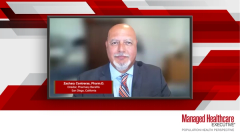
Where Do We Go From Here? Overcoming Barriers in NMIBC Care
An expert discusses how clinicians now face the exciting challenge of selecting optimal treatments from multiple new options for BCG-unresponsive patients, opening opportunities for clinical research to determine the best sequencing and patient-specific approaches.
Episodes in this series

Video content above is prompted by the following:
The landscape of BCG-unresponsive non-muscle invasive bladder cancer (NMIBC) treatment has transformed dramatically over the past five years with multiple new therapy approvals, creating both opportunities and challenges for practicing urologists. While these developments represent exciting progress, they also present decision-making complexities when selecting the optimal therapy for individual patients. Clinicians must now navigate multiple treatment options beyond the traditional BCG-to-cystectomy pathway, requiring careful consideration of patient-specific and practice-specific factors.
Patient selection criteria for new therapies involve multiple variables, including treatment visit frequency, tumor characteristics, size, and recurrence timeline following adequate BCG therapy. From a practice management perspective, urologists must address implementation challenges, including therapy acquisition, staff training, and safe administration protocols. The integration of new treatments requires careful planning to ensure efficient delivery without disrupting existing practice operations or compromising patient care quality.
The current era represents an unprecedented opportunity for advancing NMIBC care through continued clinical research and treatment optimization. As a bladder cancer specialist, Murray emphasizes the excitement surrounding treatment-sequence questions and personalized therapy selection. The expanded treatment landscape opens new avenues for clinical trials and studies aimed at identifying the optimal therapy for specific patient populations. This research-driven approach promises to refine treatment algorithms and improve outcomes while maintaining the patient-focused care philosophy that now offers hope beyond immediate cystectomy for BCG-unresponsive disease.
Newsletter
Get the latest industry news, event updates, and more from Managed healthcare Executive.
























